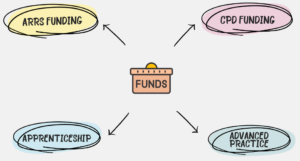Overview
MSK First Contact Practitioners are regulated, advanced and autonomous healthcare professionals trained to provide expert MSK assessment, diagnosis and first-line treatment, self-care advice and if required and appropriate, discharge a person without medical or onward referral.
The development of First Contact Practitioner MSK (FCP) services across the UK allows people with musculoskeletal (MSK) conditions to access MSK physiotherapy expertise at the start of the pathway, ensuring timely access to diagnosis, early management and onward referral if necessary. This benefits patients, primary care and the wider MSK system.
Scope of Practice
Role Responsibilities
- Advanced MSK assessment and diagnosis
- Provide information on self-care and enable and support behaviour change
- Discuss fitness for work
- Undertake social prescribing
- Discuss physical activity and health (e.g. smoking cessation and weight management)
- Refer to a course of treatment (e.g. physiotherapy or podiatry)
- Refer to orthopaedic / rheumatology / pain services
- Request investigations
- Medicines optimisation
- Administer joint / soft tissue injections (if qualified).
Link for more information on MSK First Contact Practitioner: NHS England: MSK First Contact Practitioner
Entry Requirements
- BSc in Physiotherapy
- At least 3 years post graduate experience in MSK and 5 years post graduate study
- Health and Care Professions Council (HPCP) Registered
- Usually working at an Agenda for Change Band 7
- Advanced MSK practitioners (AP’s) may work at a Band 8a (the role is evaluated and will be determined by the complexity of the clinical workload and the scope of the role)
Training and Development
Mandatory Training
See above ‘Entry Requirements’
Standard Training (on entry to Primary Care)
First Contact Practitioner (FCP) Recognition
FCP roles began with the development of the FCP Physiotherapist in 2014, in response to the shortage of GPs in Primary Care. FCP roles are designed to support GPs as part of an integrated care team and to optimise the patient care pathway by seeing the right person in the right place at the right time.
To create sustainability for multi-professional FCP roles, there is a need to build a clear national Primary Care training pathway for clinicians moving into FCP roles and then onto Advanced Practitioner roles. Therefore the NHSE ‘Roadmaps to Practice’ were published to support educational pathways for clinicians.
Please find below links to the Roadmap to Practice which will help service providers, managers and Physiotherapists themselves to identify what training, qualifications and competencies they should have to safely and effectively practice at first contact practitioner levels.
The Musculoskeletal Core Capabilities Framework (2018)
Working alongside the ‘First Contact Practitioners AND Advanced Practitioners in Primary care (Musculoskeletal); Roadmap to practice (link above), FCPs must have completed both stage 1 and Stage 2 of the Roadmap to gain recognised First Contact Practitioner MSK status.
- The Physiotherapist can be seen as a ‘trainee FCP’ until full FCP recognition is gained.
- At present there are 2 main educational pathways by which one can train to be a First Contact Physiotherapist;
- 1. Via an FCP portfolio completely
- 2. Via portfolio with taught routes via HEI’s.
- There are two stages to First Contract Practitioner recognition;
- Stage 1: Preferably, must be completed with a portfolio of evidence and verified before employment in Primary Care. The KSA must be completed prior to employment as a FCP or AP in Primary Care to assure patient safety. For MSK clinicians already working in primary care this can be completed retrospectively.
- Stage 2: Is completed with a portfolio of evidence and verified in Primary Care. This is the recognition process of the application of the KSA in Stage 1 to clinical practice in Primary Care. Best practice is that this should be completed within 6 – 12 months for a full-time member of staff but this can be longer provided a completion date is agreed with the employer.
- ‘Trainee’ FCP’s are advised to keep a folder of evidence ready to submit in the final stages of their pathway.
Education providers
There are education providers across the UK that are successfully running MSK FCP taught modules. NHSE has also provided funding support for applicants to attend these modules. All the providers have committed to taking learners from outside the region that they are based.
Please see information and links below to each provider for further information. If you are looking to enquire about an FCP taught module, please contact the education provider directly to discuss your individual requirements.
Additional Training
- Advanced Practice Recognition – Please see link to the SNEE TH Advanced Practice page for full information on Advanced Practice
Supervision Requirements
Supervision is a process of professional learning and development that enables individuals to reflect on and develop their knowledge, skills and competence, through regular support from another professional.
Supervision can have different forms and functions and a number of terms are used to describe these. For this guidance we use the below terms and define them as follows:
- Clinic/practice supervision: day-to-day support provided by a named/duty senior/more experienced clinician for issues arising in the practice.
- Clinical/professional supervision: regular support from a named senior/experienced clinician/practitioner to promote high clinical standards and develop professional expertise.
- Educational supervision: supports learning and enables learners to achieve proficiency.
It is recommended that Physiotherapists have access to appropriate clinical supervision and an appropriate named individual in the PCN to provide general advice and support on a day-to-day basis. This would typically be more senior/experienced physiotherapist, recognised Advanced Practitioner or may also be another registered health care professional as appropriate i.e. GP, consultant practitioner. Recommended minimum frequency of a 1-hour supervision meeting is monthly. (NHSE Supervision guidance, 2023 – link below)
Supervision Guidance for primary care network multidisciplinary teams (NHSE, 2023)
Clinical and Education supervisors have an integral role to support learners through the FCP Recognition process and to provide assurance that the practitioner has demonstrated the knowledge, skills and attributes required to work in a FCP role in primary care. One of their key roles is to review a learner’s portfolio of evidence and decide whether the individual has met the requirements of an appropriate FCP Roadmap.
For both the FCP Supported Portfolio and FCP Taught routes, Clinical and Education supervisors will work with an education provider, as part of the institution’s quality assurance processes, to support the learner to meet the appropriate level 7 learning outcomes of the applicable FCP Roadmap. Supervisors will sign-off the portfolio of evidence on successful completion.
The route to becoming a supervisor for FCP recognition and training has recently been updated. Please see the NHSE ‘First Contact Practice FAQ’s’ page here for the latest updates on the process: First Contact Practice FAQs | Health Education England (hee.nhs.uk)For further information regarding the FCP Roadmap pathway and processes, please visit: Roadmaps to Practice | Health Education England (hee.nhs.uk)
Funding
AFC Band 7/8a
100% of actual salary plus defined on costs covered via ARRS Scheme.
Training and development funding

FCP Physiotherapists may be entitled to wider NHSE commissioned funding to support their training and development requirements. Please contact the training hub for more information on this.
Recruitment Information
Where a PCN employs or engages a First Contact Physiotherapist under the Additional Roles Reimbursement Scheme, the PCN must ensure that the First Contact Practitioner Physiotherapist meets the ‘Minimum Role Requirements’ stipulated in Annex B of the Network DES: Network Contract DES (england.nhs.uk)
Please find various resources in this section to assist in the recruitment and embedding of the First Contact Practitioner Physiotherapist role in General Practice.
Recruitment Resources
What FCP Physiotherapists can offer you
About FCP Physiotherapy Services The Chartered Society of Physiotherapy (csp.org.uk)
Job description example (NHSE)
HEE Musculoskeletal First Contact Practitioner Services: Implementation guide
FCP Induction checklist example
GP Reception Materials and care navigator resources (Posters, screen savers, checklists)
Additional Resources
Professional Resources
MSK First Contact Practitioners Videos
Physiotherapist Peer Support Network
The SNEE training hub launched a Physiotherapist support network in 2022. This support network aims to provide Physiotherapists working in GP surgeries across the Suffolk and North East Essex region, with opportunities to attend physiotherapist led, free networking and CPD opportunities.


